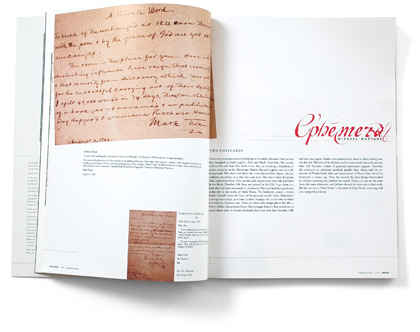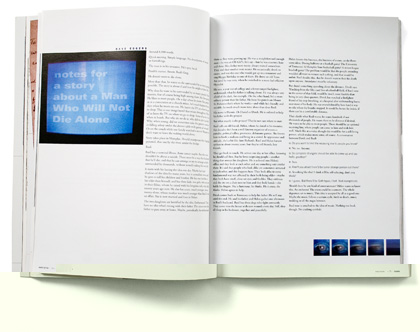Journal – No. 1
Spring/Summer 2004 – Vol. 1, No. 1
Sample Spreads


Contributors
Art
Linda Connor, Reagan Louie, Shahzia Sikander
Fiction
Katherine Vaz, Robert Olen Butler, Steve Almond, Dave Eggers, Jill Glass, Lynne Sharon Schwartz, Eric Kraft, Adam Levin, Christian Tebordo
Nonfiction
Mark Twain, Marjorie Sandor, Jerry Wemple, Robin Hemley, Dave Zoby, May Berenbaum, Michael Martone
Poetry
Tomaz Salamun, John Witte, Louis Jenkins, Mark Halliday, Carol Frost, Mark Doty, Joy Manesiotis, Tony Hoagland, Gabrielle Calvocoressi, Susan Hahn
Interview
Yann Martel, interviewed by Philip Graham
Editor’s Note
My life is a series of paradoxes: I love literature, and I hate it; I find the Midwest both exhilarating and oppressive; I’m ambivalent at best about MFA programs in writing but am myself a product of one. The combination of these contradictions has led me to this juncture, writing an introduction to a new literary magazine published by the new graduate writing program at the University of Illinois. After several whirlwind weeks of organizing, soliciting work, holding meetings, finalizing content, crunching budget figures, and studiously avoiding any number of mental breakdowns, now is the time for me to stop and reflect and ask myself why. Why am I here? Why are we doing this? Why do I care, and why should anyone?
Art does not exist in a void. This assertion has long been my touchstone, and is the basis for much of my dissatisfaction with certain trends in both contemporary literary writing and the methods used to teach it in creative writing programs. There is, it seems, a tendency to ignore or wish away the influence on literature of pop culture, science and technology, and the evolution of language, among other things. What literary writing is, in America, at least, often seems to be defined by a narrow script that does not allow for much risk-taking, unless the risks have somehow been pre-approved. There is a tendency in literary publishing to drift toward the comfort of the known; that’s human nature, after all. And yet, if literary magazines have a collective purpose, isn’t it to push toward discomfort — to continually search for the unknown, to find new ways of exploring the human condition, to take into account the constant growing and changing world?
I come back to my initial question, Why? – a question that is, not coincidentally, also raised in the written purpose statement of 9th Letter:
9th Letter is a publication that rejects the notion that literature is an isolated mode of expression. Instead, we recognize and seek the intersections of literature with various fields of creative and intellectual life, such as visual arts, journalistic arts, science, history, and cultural studies. We seek these intersections not only in the creative content we accept, but also in the overall design and form of the magazine itself. In this sense, we view the magazine as an organic work of art: the overall interaction among the components is as important as the discreet objects within the content. This approach necessarily forces us, within our pages, to ask and answer the question Why? In other words, we intend to undercut the recent tradition of so-called “clever” publications by raising the aesthetic choices of the magazine within the content of the magazine itself. As a result, dialogue will serve a central role, acting as a bridge between the disparate aspects of the magazine. Therefore, each issue will not be a mere container for discreet, isolated objects; rather, it will — on all levels, from content to graphic design — generate a full, cohesive conversation.
Note that this purpose statement wasn’t written by me; it was written by Assistant Editor Chris Maier back in July 2003, when the magazine was still in its planning stages. I was given this statement as an introduction to the project in August, during my interview for this job. Imagine me then, a skeptic toward any new start-up journal, disillusioned by what I perceived as stagnancy in the field of literary publishing — a field I continued to work in even as I railed against it and searched ceaselessly outside its parameters for truly fresh and inventive writing. Imagine me, applying for a job in Illinois primarily because it would bring me back to my Midwestern roots after a decade in the East, only to encounter, serendipitously, a project envisioned by writers and poets who, like me, felt a dissatisfaction with the arbitrary boundaries placed around literary writing, who wanted to see those boundaries razed, who wanted to see an artistic and cultural conversation encouraged and brought to the fore. I was startled, to say the least, and for the first time in a very long time (at least with respect to literature), I was hopeful.
Each of the pieces in this first issue of 9th Letter was accepted on its merit; we were working toward no overriding themes, and for the most part, the editors in each genre were working independently of one another, so the placement of the poems in the context of the stories and essays, and vice versa, was not a consideration. And yet, as the issue grew, it became clear that the pieces do speak to one another, there are underlying themes and overt connections, so much so that we joked at times about greater forces than coincidence at work. What is more likely, though, than the intervention of a higher power, is simply that we are beginning to tap into an ongoing cultural dialogue, a perpetual Zeitgeist, if you will, in which various forms of cultural expression are reflecting and responding to one another. It is inevitable, because we are not, and should not try to be, isolated. 9th Letter’s mission is to illuminate and perpetuate that dialogue.
So read on, then. See if we succeed, or if we fail. Either way, let us know what you think — without you, the reader, the conversation would have no reason to exist, and could not continue.
— Jodee Rubins
Awards
Best American Short Stories 2005
“A Taste of Dust” – by Lynne Sharon Schwartz
University and College Designers Association 2005
UCDA Gold Medal – Complete Unit Design
University and College Designers Association 2005
UCDA Gold Medal – Cover Design
Credits
Editor
Jodee Rubins
Fiction Editor
Philip Graham
Poetry Editor
Michael Madonick
Art Editor
Joseph Squier
Assistant Editors
J Anderson Frazee, Patrick Lane, Christopher Maier, Katherine Mauer, Robert McCarthy, Neelay Shah, Chris Wiberg
Designers
Nan Goggin, Jennifer Gunji-Ballsrud
Assistant Designers
Daniel Goscha, Lauren Hoopes
